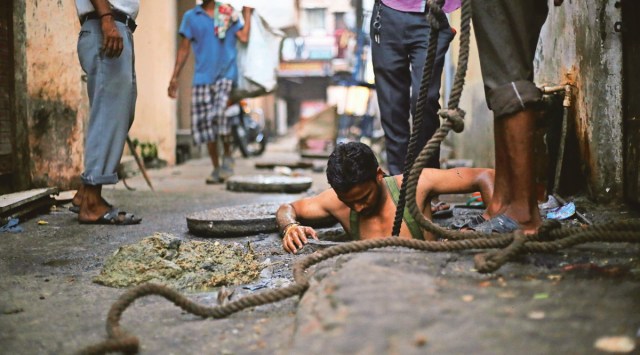When Finance Minister Nirmala Sitharaman announced “mechanical desludging of septic tanks and sewers” in her budget speech, 61-year-old Birbal Kumar could not help but think of his son Vishal (22), who died while cleaning a sewage treatment plant in DLF Capital Greens society in Delhi’s Moti Nagar in September 2018.
“This should have been done a long time ago. What will I do with this (scheme) now? I have lost my son; he will not come back anyway,” Kumar said.

Four other people, aged between 19 and 26, died in the incident.
Story continues below this ad
A police investigation report of the case stated, “The cleaning of the STP was undertaken by M/s Unnati company… Five employees went into the plant. They became unconscious as they were not equipped with safety equipment. The victims were taken out by Delhi Fire Services staff from the sewage tanks from basement 2 and 3 of tower P of residential society.”
Five people, including the director of the company, were booked and a chargesheet was filed on November 5, 2018; however, the case is still pending in the court. “It was Sunday, his day off, but someone from the company called and asked him to come to get his salary. Promising salary, they sent him into the sewer to die. It was just 4-5 months after he started working there,” said Birbal Kumar.
Another victim in the same incident was 19-year-old Mohd Sarfaraz. Hailing from Bihar’s Darbhanga, his brother Mohd Mehraz hopes that Sitharaman’s announcement will save the lives of other manual scavengers.
“Had there been any such facility available earlier, my brother would have been sitting beside me. But they sent people in the manhole without any safety kit. There are many victims like us who nobody hears,” said Mehraz, who works at a shop with his father.
Story continues below this ad
“However, this decision can help a number of safai karamcharis, if implemented properly. My brother, just 19 years old, did not get a chance to live. I do not want this to happen to anyone,” he said.
In a bid to prevent deaths from manual scavenging, the government is moving entirely towards mechanical desludging of sewers. As a part of the urban sanitation announcement, the finance minister said on Wednesday, “All cities and towns will be enabled for 100 per cent mechanical desludging of septic tanks and sewers to transition from manhole to machine-hole mode. The enhanced focus will be provided for scientific management of dry and wet waste.”
Despite laws banning manual scavenging, the practice continues unabated, with contractors often outsourcing work to daily wagers for as little as a few hundred rupees a day.
Bezwada Wilson, a Ramon Magsaysay Awardee and National Convenor of the Safai Karamchari Andolan (SKA), an organisation working for complete eradication of manual scavenging, said the announcement should have had details of how much money is allocated and how this will be achieved.
Story continues below this ad
“This (announcement) is not happening for the first time. At the time of the budget, the government starts talking about manholes, but what about promises made earlier? What happened to the budget allocation of 2022-23, where was it spent? I am not against mechanisation. But there is a process — liberation to rehabilitation and then mechanisation. The government is completely missing the human link in the practice,” said Wilson.
He added, “There is no budget allocation for this announcement. No budget allocation to provide compensation and help to those families whose members died in the manhole. There is no proper survey showing how many people are forced to engage in the practice. Dalits are dying every day. You have a mission for toilet construction, but who will rehabilitate those who cleaned your toilets. Who will talk about the details?”
The former chairperson of the National Commission for Safai Karamcharis (NCSK), Manhar Valji Bhai Zala, who retired in March 2020, said that this is a leap towards preventing deaths of safai karamcharis.
“This is completely in line with the recommendation of the commission. In my final tenure as the chairperson, we recommended that if manual scavenging is to be eradicated completely, a mechanised system of cleaning may be made mandatory. This will solve the whole crisis,” he said.









